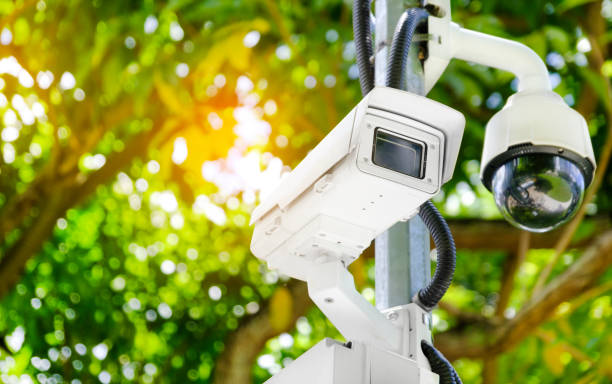Regular CCTV Camera Maintenance to Avoid Security Risks

In today’s world, security is of paramount importance, both at home and in business environments. CCTV cameras play a crucial role in ensuring that our properties and assets are secure, providing real-time monitoring, recording footage, and acting as a deterrent to potential intruders. However, simply installing CCTV cameras is not enough. Regular maintenance is vital to ensure these systems function optimally and continue to offer the protection they were designed for. Failure to maintain your CCTV system can lead to security risks, such as blind spots, unclear footage, and even system failures. To ensure the highest level of protection, it’s important to choose the Best Security company for regular servicing and maintenance of your CCTV system.
The Importance of Regular CCTV Camera Maintenance
CCTV cameras, like any other electronic system, require periodic maintenance to ensure they remain in good working order. Without proper care, even the best security systems can become ineffective. The importance of regular CCTV camera maintenance lies in its ability to prevent security risks that can compromise your property’s safety.
Maintenance ensures that your cameras are functioning properly, recording clear footage, and covering all critical areas of your property. This is particularly important in high-risk environments like commercial buildings, banks, or residential complexes where security is a top priority.
Common CCTV Issues That Maintenance Can Prevent
CCTV cameras are subjected to various environmental factors, such as dust, weather conditions, and power surges. Over time, these factors can cause the cameras and related equipment to deteriorate or malfunction. Regular maintenance helps identify potential issues before they become major problems. Some common CCTV issues that can be prevented through regular maintenance include:
-
Poor Image Quality: Over time, dust and dirt can accumulate on the camera lens, causing blurry or unclear footage. Regular cleaning of the lenses ensures that the cameras capture sharp and detailed images.
-
Power Failures: If the cameras or the recording devices experience power issues, they may stop working altogether. Maintenance checks on power supplies, cables, and backup systems can help prevent such failures.
-
Camera Alignment: CCTV cameras need to be properly aligned to cover the right areas. Vibration, wind, or physical contact can cause cameras to become misaligned, resulting in blind spots. Regular checks can ensure that all cameras are positioned correctly.
-
Network Issues: CCTV systems often rely on a network to transmit video footage. A faulty connection can lead to delays or interruptions in monitoring. Routine maintenance ensures that all network connections are stable and secure.
-
Hardware Wear and Tear: Just like any other equipment, CCTV cameras and accessories can experience wear and tear over time. Components such as wires, connectors, and mounts may need to be replaced periodically to ensure continuous operation.
How Regular Maintenance Can Prevent Security Breaches
Neglecting CCTV camera maintenance can lead to security breaches that could have been easily avoided. If a camera malfunctions or the system fails to record crucial footage, the consequences can be devastating. Regular maintenance can help identify vulnerabilities in the system and address them before they lead to a security risk. Some ways in which regular maintenance can prevent security breaches include:
-
Ensuring Clear and Consistent Footage: Clean lenses and properly functioning equipment ensure that your cameras record clear and detailed images. This is crucial for identifying intruders or gathering evidence in case of a crime. Regular checks will prevent the system from losing quality, especially in low-light conditions or at night.
-
Maintaining System Reliability: A well-maintained CCTV system is more reliable and less likely to experience failures. Regular inspections can identify potential problems, such as faulty wiring, outdated software, or damaged components, allowing you to address them before they cause the system to stop working altogether.
-
Preventing Data Loss: Many CCTV systems store video footage on hard drives or cloud storage. Over time, hard drives can become full, corrupted, or damaged. Regular maintenance includes checking the storage system and ensuring that there is enough space for recording. It also involves backing up data to prevent loss in case of system failures.
-
Minimizing Downtime: CCTV cameras and other security systems should be running 24/7. If a system is not properly maintained, it may experience unexpected downtimes, leaving your property unprotected. Routine maintenance helps identify and address issues quickly, reducing the chances of prolonged downtime.
Key Components of CCTV Camera Maintenance
CCTV camera maintenance involves several tasks aimed at keeping the entire system running smoothly. These tasks include:
-
Camera Lens Cleaning: As mentioned earlier, dust, dirt, and weather conditions can affect the quality of the footage. Regular cleaning of the camera lenses is essential to ensure that the cameras capture clear and sharp images. This should be done by professionals to avoid damaging the lenses or the camera itself.
-
Checking Camera Alignment: It’s important to ensure that the cameras are pointing in the right direction to capture the required footage. A simple realignment can improve the coverage area and eliminate blind spots.
-
Inspecting Power Sources: The power supply to the cameras and recording devices should be inspected regularly. This includes checking for any frayed wires, loose connections, or faulty power adapters. Backup power sources, such as batteries or generators, should also be tested to ensure they are operational in case of power outages.
-
Upgrading Software and Firmware: CCTV cameras and recorders often have software and firmware that require periodic updates. Keeping the system up to date ensures that the cameras are running at their best and can integrate new features and security patches.
-
Testing Connectivity: Network connectivity is a crucial aspect of modern CCTV systems. If your CCTV system is connected to a network, it’s essential to test the connections regularly to ensure there are no interruptions in the signal. This includes checking for wireless signal interference or faulty cables.
-
Hard Drive and Storage Checks: It’s essential to check the health of the storage device where the footage is recorded. Regular maintenance involves checking the hard drive’s capacity, integrity, and speed, ensuring that there is sufficient space for new recordings and that old footage is appropriately archived or deleted.
Professional CCTV Maintenance Services
While some maintenance tasks can be performed by property owners, others require the expertise of professionals. Hiring a professional CCTV maintenance service ensures that the system is properly inspected and maintained, reducing the risk of overlooking important details. These professionals can also offer advice on upgrading your system as new technologies emerge.
Many CCTV maintenance companies in Dubai offer regular service packages that include scheduled inspections, cleaning, and technical support. These services are an investment in the longevity and effectiveness of your security system.
Conclusion
Regular CCTV camera maintenance is not just a recommendation; it is a necessity to avoid security risks. With proper upkeep, your CCTV system will continue to function reliably, providing the peace of mind you need to protect your property. Routine checks, cleaning, and updates will ensure that your cameras capture high-quality footage, prevent technical failures, and minimize the chances of security breaches. By investing in regular maintenance, you are taking proactive steps to safeguard your property and ensure the longevity of your security system.

